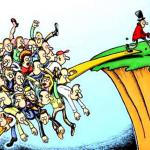- Paul Krugman, Oct.24, 2014.
It’s always good when leaders tell the truth, especially if that wasn’t their intention. So we should be grateful to Leung Chun-ying, the Beijing-backed leader of Hong Kong, for blurting out the real reason pro-democracy demonstrators can’t get what they want: With open voting, “You would be talking to half of the people in Hong Kong who earn less than $1,800 a month. Then you would end up with that kind of politics and policies” — policies, presumably, that would make the rich less rich and provide more aid to those with lower incomes.
So Mr. Leung is worried about the 50 percent of Hong Kong’s population that, he believes, would vote for bad policies because they don’t make enough money. This may sound like the 47 percent of Americans who Mitt Romney said would vote against him because they don’t pay income taxes and, therefore, don’t take responsibility for themselves, or the 60 percent that Representative Paul Ryan argued pose a danger because they are “takers,” getting more from the government than they pay in. Indeed, these are all basically the same thing.
For the political right has always been uncomfortable with democracy. No matter how well conservatives do in elections, no matter how thoroughly free-market ideology dominates discourse, there is always an undercurrent of fear that the great unwashed will vote in left-wingers who will tax the rich, hand out largess to the poor, and destroy the economy.
In fact, the very success of the conservative agenda only intensifies this fear. Many on the right — and I’m not just talking about people listening to Rush Limbaugh; I’m talking about members of the political elite — live, at least part of the time, in an alternative universe in which America has spent the past few decades marching rapidly down the road to serfdom. Never mind the new Gilded Age that tax cuts and financial deregulation have created; they’re reading books with titles like “A Nation of Takers: America’s Entitlement Epidemic,” asserting that the big problem we have is runaway redistribution.
This is a fantasy. Still, is there anything to fears that economic populism will lead to economic disaster? Not really. Lower-income voters are much more supportive than the wealthy toward policies that benefit people like them, and they generally support higher taxes at the top. But if you worry that low-income voters will run wild, that they’ll greedily grab everything and tax job creators into oblivion, history says that you’re wrong. All advanced nations have had substantial welfare states since the 1940s — welfare states that, inevitably, have stronger support among their poorer citizens. But you don’t, in fact, see countries descending into tax-and-spend death spirals — and no, that’s not what ails Europe.
Still, while the “kind of politics and policies” that responds to the bottom half of the income distribution won’t destroy the economy, it does tend to crimp the incomes and wealth of the 1 percent, at least a bit; the top 0.1 percent is paying quite a lot more in taxes right now than it would have if Mr. Romney had won. So what’s a plutocrat to do?
One answer is propaganda: tell voters, often and loudly, that taxing the rich and helping the poor will cause economic disaster, while cutting taxes on “job creators” will create prosperity for all. There’s a reason conservative faith in the magic of tax cuts persists no matter how many times such prophecies fail (as is happening right now in Kansas): There’s a lavishly funded industry of think tanks and media organizations dedicated to promoting and preserving that faith.
Another answer, with a long tradition in the United States, is to make the most of racial and ethnic divisions — government aid just goes to Those People, don’t you know. And besides, liberals are snooty elitists who hate America.
A third answer is to make sure government programs fail, or never come into existence, so that voters never learn that things could be different.
But these strategies for protecting plutocrats from the mob are indirect and imperfect. The obvious answer is Mr. Leung’s: Don’t let the bottom half, or maybe even the bottom 90 percent, vote.
And now you understand why there’s so much furor on the right over the alleged but actually almost nonexistent problem of voter fraud, and so much support for voter ID laws that make it hard for the poor and even the working class to cast ballots. American politicians don’t dare say outright that only the wealthy should have political rights — at least not yet. But if you follow the currents of thought now prevalent on the political right to their logical conclusion, that’s where you end up.
The truth is that a lot of what’s going on in American politics is, at root, a fight between democracy and plutocracy. And it’s by no means clear which side will win.


